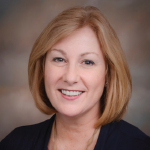PHILADELPHIA—When she saw vaping taking hold at a middle school, heightening the risk of turning children into smokers as well as boosting the risk of rheumatic disease, Kamala Nola, PharmD, MS, went to work. Dr. Nola, associate dean of academic affairs at Lipscomb University, Nashville, called the Tennessee Pharmacists Association to express her concern.
“This is not good,” she told the association. Soon, she was speaking at a press conference on the topic alongside state legislators, who wanted to introduce legislative language on tobacco use, vaping and related comorbid conditions.
“I went in and talked not just as a health professional, but as a mom and someone who cares for patients,” said Dr. Nola, recalling the occasion in a Distinguished Lecture at ACR Convergence 2022. “That passion came through, and it plays a role.”
In her talk, Dr. Nola emphasized that healthcare professionals should “play to your strengths” and speak out and take action on topics they feel strongly about. And she asked the audience to reconsider the concept of advocacy: It’s not just overt government-related activity, she stressed, but everyday actions as well.
“We bring the role of an advocate with lots of differing strengths that we have,” she said. “It doesn’t have to be just a communicator, just a learner, an analytic person or an interconnector. Whatever those strengths are, they are all related to advocacy.
“The way we give drug information, the way we give instructions when they’re discharged from the hospital after knee replacement—those are advocacy pieces,” she said.
Fueling Advocacy with Collegiality
The culture of the medical field can act as a kind of advocacy fuel, she suggested. Attending the American Juvenile Arthritis Organization meeting in 1998 was a seminal moment for her, leading to lifelong relationships with mentors and others interested in advocacy.
“That conference changed my life,” she said. “As a result of that meeting, my husband and I made a decision as a family that we would always commit to working with those who have arthritis.”
Attending conferences still feeds into her advocacy mentality, she said.
“When I come to this meeting and when I go my Tennessee Pharmacists Association meetings or my national pharmacy meetings, I get revved, I get excited, because I’m with like-minded people,” she said. “Why is that? Part of it has to do with culture. We are here for a common reason.”

